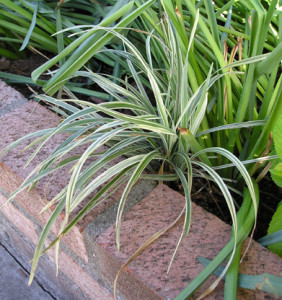Liriope spicata is a species of low, herbaceous flowering plants from East Asia. Common names include creeping lilyturf, creeping liriope, lilyturf, and monkey grass. This perennial has grass-like evergreen foliage and is commonly used in landscaping in temperate climates as groundcover.
Contents
Uses
- Lilyturf root is the species of this plant most commonly used in Oriental herbal medicine. It is useful in treating intestinal, kidney, and liver problems. It has been found to stimulate the production of milk in nursing mothers and to reduce inflammation. It has cough suppressing properties, and is used in treating nearly all lung-related illnesses, including bronchitis, whooping cough, tuberculosis, hemoptysis (coughing up blood), sore throat, laryngitis, and cough. A chemical present in the plant has shown effectiveness in the treatment of lung tumors. It is also used to treat fever, constipation, and stomach problems.
- Lilyturf root is used for its cough suppressant qualities. It is also an expectorant, a cardiac tonic, and an anti-inflammatory agent.
- Lilyturf root has diuretic properties that are useful in reducing fluid retention in the body caused by either heart or kidney disease.
- Lilyturf root is considered an aphrodisiac, a treatment for digestive disturbance, and a galactogogue, or stimulator of lactation in nursing mothers.
Cautions
Please consult your pharmacist.
Interactions
None are recorded.
Other names
creeping lilyturf, creeping liriope, lilyturf, and monkey grass
References
Source: Wikipedia, https://en.wikipedia.org/wiki/Liriope_spicata
Altmd, http://www.altmd.com/Articles/Ophiopogon–Encyclopedia-of-Alternative-Medicine

